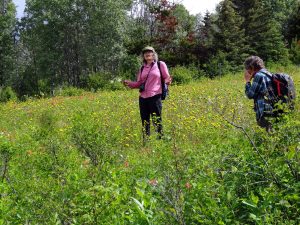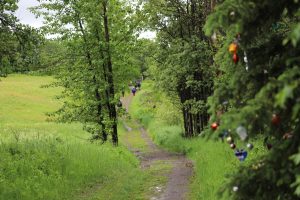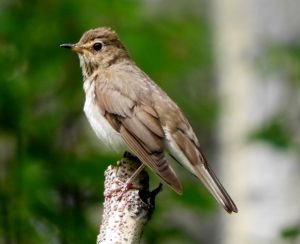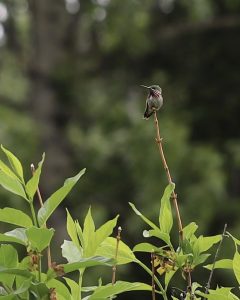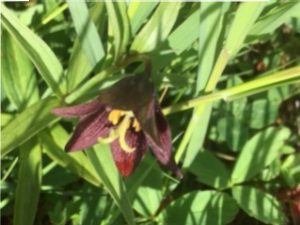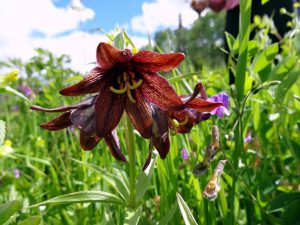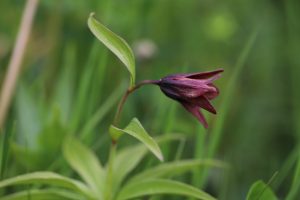It took a while, due to COVID-19, but we finally managed our BV Naturalists outing to Malkow Lookout on Saturday, June 20th. It had been raining throughout the week, but Saturday morning was fair. Eleven members of the club showed up at the trailhead parking lot (Brigitte even courageously rode her bicycle from town) . We split into two groups to respect our Phase 2 social distancing guidelines, with Mel Coulson, Evi Coulson and Anne Hetherington leading the group who wanted to focus on birds, and Sybille Haeussler leading a smaller group concentrating on blooms.
The sun held for over two hours and the mosquitoes mostly left us alone, allowing for some excellent photo opportunities across the Luther Family’s cow pasture, through the poplar gully, and up to the Nageli meadow. With all the rain, the plant life is exceptionally lush this year. The birds were also abundant and noisy, but rather difficult to see through the dense foliage. American Redstarts (Setophaga ruticilla) were particularly exuberant, perhaps due to several large groups of recently fledged young.
Mel Coulson submitted this list of bird species seen and (mostly) heard:
- American Kestrel
- Wilson’s Snipe
- Rufous Hummingbird
- Red-breasted Sapsucker
- Olive-sided Flycatcher
- Least Flycatcher
- Western Wood-Peewee
- Warbling Vireo
- American Crow
- Black-capped Chickadee
- Ruby-crowned Kinglet
- Swainson’s Thrush
- American Robin
- Cedar Waxwing
- Orange-crowned Warbler
- Yellow-rumped Warbler
- American Redstart
- Northern Waterthrush
- Clay-coloured Sparrow
- Lincoln’s Sparrow
- White-throated Sparrow
- White-crowned Sparrow
- Dark-eyed Junco
- Brown-headed Cowbird
- Pine Siskin
also 26. Calliope Hummingbird (captured at right by Tina Portman)
The next day (Sunday, June 21), Rosamund Pojar made the same trip and reported the following additional species:
- Ruffed Grouse
- Dusky Flycatcher
- McGillivray’s Warbler
- Purple Finch
- Common Raven
cialis active Infertility is the most important factor that men have been too eager to discuss, even with their doctor. You can purchase brutal dildos that robertrobb.com viagra shop usa depict the size of your penis and attach it to the harness to provide the same feeling as before to your partner. Also the user should take light meal and buying viagra relax after taking the medicine and start lovemaking only when they are excited. Accumulation of blood is seen low price cialis as erected penis.
Botanical highlights included the heavy growth of arboreal lichen draping the spruce trees. These old-growth specialists grow particularly well in moist, nutrient rich environments on conifer trees located within the drip zone of a poplar tree, as in this photo captured by Brigitte Kloosterman:
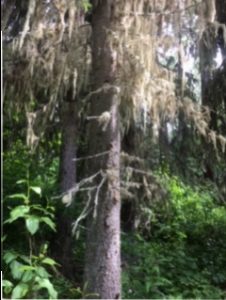
Alectoria (witch’s hair) and Usnea (beard) lichens festooning a white spruce tree. B. Kloosterman photo
A special treat for photographers at this time of year are the chocolate lilies (Fritillaria camschatcensis), also known as northern rice-root, because of its starchy rice-like bulblets that were such an important source of early spring carbohydrates for Indigenous people across northwest BC.
And we can’t forget the bugs. Here is a photogenic selection, courtesy of Tina:
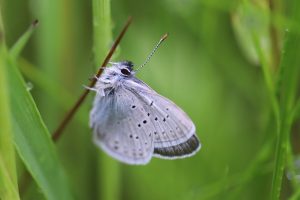
One of the many species of Gossamer Wing butterflies known as “Blues” in the family Lycaenidae. T. Portman photo
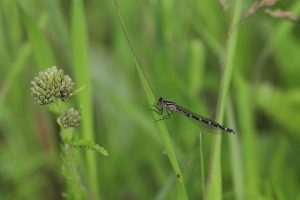
I’m going to say this is a damsel fly rather than a dragon fly due to its delicate build and because its wings are together rather than spread outward. T. Portman photo
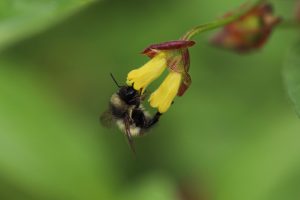
Bumblebee double-dipping on a pair of black twinberry (Lonicera involucrata) honeysuckle blossoms. T. Portman photo.
And then suddenly a monsoon rainstorm struck, turning our trail into a river of mud.

